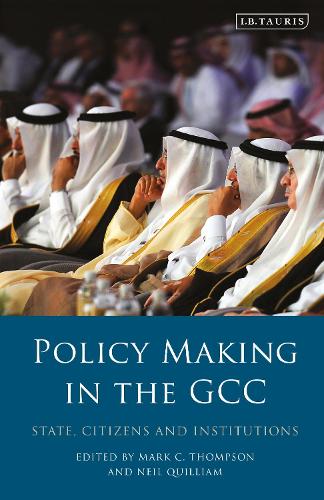
Policy-Making in the GCC: State, Citizens and Institutions
(Paperback)
Publishing Details
Policy-Making in the GCC: State, Citizens and Institutions
By (Author) Neil Quilliam
Edited by Mark C. Thompson
Bloomsbury Publishing PLC
I.B. Tauris
31st October 2019
United Kingdom
Classifications
Tertiary Education
Non Fiction
Political economy
Constitution: government and the state
Public administration / Public policy
Political structures / systems: democracy
Civics and citizenship
Political leaders and leadership
Impact of science and technology on society
Central / national / federal government
Political science and theory
341.2477
Physical Properties
Paperback
368
Width 138mm, Height 216mm
426g
Description
The GCC is a major player in the post-2011 reordering of the Middle East. Despite the rise in prominence of individual Gulf states - especially Kuwait, Qatar, Saudi Arabia and the United Arab Emirates - and the growth of the GCC as a collective entity, surprisingly little attention has been paid to the actual mechanics of policy-making in the region. This book analyses the vital role that institutions are coming to play in shaping policy in the Gulf Arab states. The research coincides with two key developments that have given institutions new importance in the policy process: the emergence of a new generation of leaders in the Gulf, and the era of low oil prices. Both developments, along with dramatic demographic change, have compelled state and citizens to re-evaluate the nature of the social contract that binds them together. Contributors assess the changing relationship between state and citizen and evaluate the role that formal and informal institutions play in mediating such change and informing policy.The book shows how academic, social and economic institutions are responding to the increasingly complex process of decision-making, where citizens demand better services and further empowerment, and states are obliged to seek wider counsel, although wanting to retain ultimate authority. With contributions from both academics and practitioners, this book will be highly relevant for researchers and policymakers alike.
Author Bio
Mark C. Thompson is Assistant Professor of Middle East Studies at King Fahd University of Petroleum and Minerals in Dhahran, Saudi Arabia. He is also Senior Associate Fellow at the King Faisal Center for Research and Islamic Studies in Riyadh. His publications include Saudi Arabia and the Path to Political Change: National Dialogue and Civil Society (2014) and articles in the Journal of Arabian Studies; Asian Affairs; Middle Eastern Studies; and Diplomacy and Statecraft. Neil Quilliam is Senior Research Fellow in the Middle East and North Africa Programme at Chatham House, The Royal Institute of International Affairs, London. He also serves as Director for Strategic Advisory Services at Rapidan Group, an energy consultancy. Quilliam is an expert in international relations of the Middle East and focuses on the Gulf Arab states, Syria and Lebanon. Recent publications include a contribution to the book Saudi Arabian Foreign Policy: Conflict and Cooperation (2016) and an article in the journal East Asia (2015). He advises European governments on foreign policy issues and energy companies with operations in the region.
